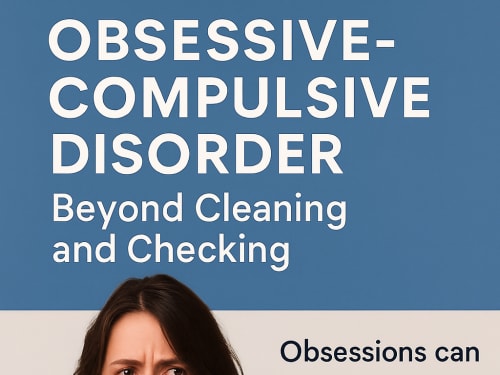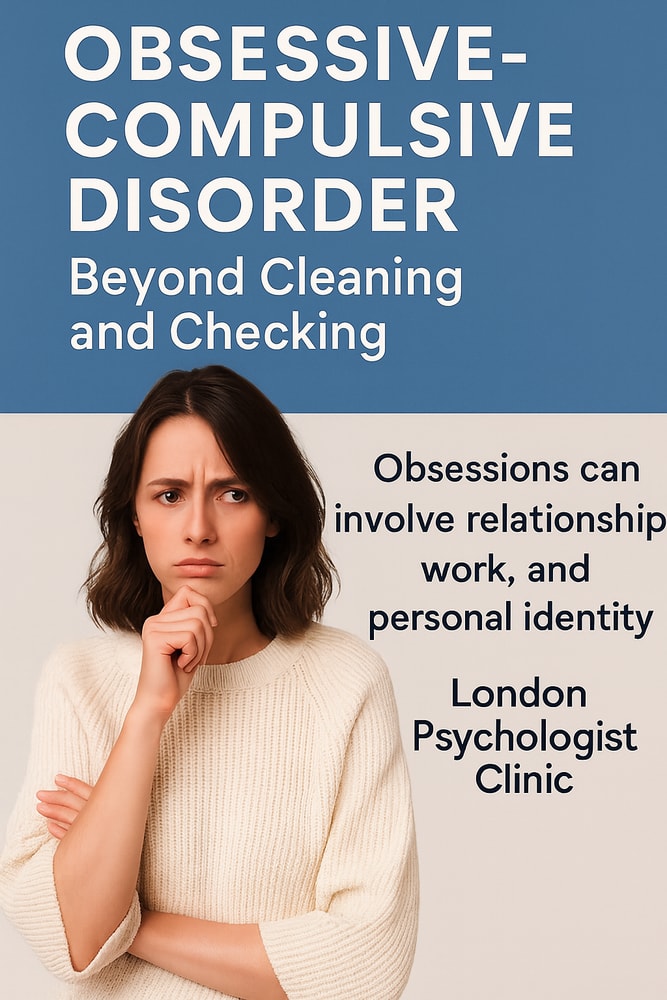OCD Beyond Checking and Cleaning

posted 4th August 2025

Obsessive-Compulsive Disorder: Beyond Cleaning and Checking
When most people hear the term OCD (Obsessive-Compulsive Disorder), they often picture someone scrubbing their hands repeatedly or checking locks multiple times. While these behaviours are valid manifestations of OCD, the condition extends far beyond what is commonly portrayed in the media.
OCD is not just about visible rituals—it's fundamentally about intrusive thoughts (obsessions) and the mental or physical actions (compulsions) someone feels driven to perform in response. Many individuals experience OCD in ways that are invisible, internal, and deeply distressing, particularly in the context of relationships, work, and personal identity.
Obsessions That Hide in Plain Sight
For some, OCD manifests not in repetitive actions, but in relentless, intrusive thoughts. These can include:
“Did I offend my colleague with that email?”
“What if I accidentally harmed someone I care about?”
“Am I secretly a bad person?”
These types of obsessions fall under a lesser-known subtype called “Pure O” (Purely Obsessional OCD). Despite the name, most individuals still engage in compulsions—but these are often mental rather than physical. For example:
Mentally reviewing past conversations for reassurance
Seeking repeated validation from others
Praying, counting, or “neutralising” thoughts to prevent imagined harm
These cognitive patterns can be exhausting, leading to significant anxiety, emotional burnout, and social withdrawal.
When OCD Targets Relationships and Work
Relationship OCD (ROCD) and Work-related OCD are specific subtypes where intrusive doubts and fears centre around:
Whether one truly loves their partner
If they said the "wrong" thing at work
Fear of being perceived as inappropriate or immoral
Guilt over imagined or exaggerated interpersonal mistakes
These individuals may appear highly conscientious, even perfectionistic—but internally, they are battling a storm of uncertainty and fear.
Diagnosis and Misunderstanding
Because these internal symptoms aren't visible, many people go undiagnosed or are misdiagnosed with generalised anxiety or depression. The DSM-5 defines OCD by the presence of obsessions, compulsions, or both, and highlights the importance of functional impairment and distress, even if no physical compulsions are observed.
This is why it's crucial to work with a clinical psychologist or specialist therapist who understands the nuances of OCD—especially when the symptoms don’t match the classic, more well-known forms.
Evidence-Based Treatment
The gold standard for OCD is CBT (Cognitive Behavioural Therapy), particularly a form known as ERP (Exposure and Response Prevention). This involves helping individuals face their fears without engaging in compulsive behaviours, which gradually retrains the brain to tolerate uncertainty.
For more cognitive-based OCD, therapists may also incorporate mindfulness, ACT (Acceptance and Commitment Therapy), and techniques to reduce rumination and cognitive avoidance.
How the London Psychologist Clinic Can Help
At the London Psychologist Clinic, we understand that OCD wears many faces. Whether you're battling visible compulsions or silent mental obsessions that interfere with your life, relationships, or work—we're here to help.
We offer tailored psychological assessments and evidence-based therapy with HCPC-registered psychologists. Many of our clients express profound relief at finally being understood and accurately diagnosed—a crucial first step in the path to recovery.



